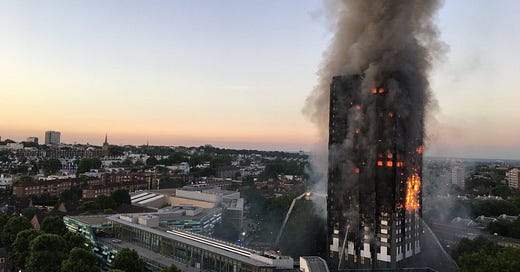Calls for Justice Eight Years After Grenfell Fire
Communities Demand Justice and an End to Austerity Policies That Fueled Tragedy
Eight years ago, on 14 June 2017, Grenfell Tower in West London caught fire, becoming one of the most devastating examples of how neoliberal policies cost lives. Seventy-two people—many of them children, elderly, people with chronic health conditions, and overwhelmingly from migrant and working-class backgrounds—were killed in the blaze, which continued for around 60 hours. Dozens more were injured. Both firefighters and community members were exposed to toxic smoke released by the materials used during the building’s refurbishment.
Political responsibility for deadly materials
It was precisely those materials, specifically the cladding, that enabled the fire to spread so rapidly. One of the most comprehensive sources confirming this is the Grenfell Tower Inquiry, finalized in late 2024. After reviewing extensive testimonies and documentation, the inquiry confirmed what residents and campaigners had been saying all along: the tragedy was the result of years of austerity, deregulation, and the prioritization of private profit over safety.
The inquiry found that both central and local government bodies, alongside the private sector, ignored clear evidence about the combustibility of the materials, choosing cost savings over human lives. The report was damning in its assessment of the private sector’s role, stating that one reason “Grenfell Tower came to be clad in combustible materials was systematic dishonesty on the part of those who made and sold the rainscreen cladding panels and insulation products.”
“They engaged in deliberate and sustained strategies to manipulate the testing process, misrepresent data and mislead the market,” the report concluded. Adding to this, privatized certification companies tasked with ensuring safety standards were found to have displayed “an ingrained willingness to accommodate customers instead of insisting on high standards and adherence to a contract that was intended to maintain them.”
The struggle for justice continues
The Grenfell fire left a lasting impact on the community, which has spent the past eight years fighting for justice. Despite multiple governments publicly acknowledging the tragedy, meaningful action has been limited. While Keir Starmer’s administration pledged to implement most of the inquiry’s recommendations and keep open communication with the public, local justice groups insist that is not enough. “We need to see real, tangible safety changes—not another list of consultations, reviews and delays,” warned the collective Grenfell United.
The demands of Grenfell justice activists share a lot with those of broader housing and health campaigns, which highlight the dangers of unaffordable rents and exploitative landlords, all forcing people into inadequate—and often unsafe—housing. While much attention has rightly been paid to cold, damp, and mold-ridden conditions, the issue of dangerous cladding like that used on Grenfell Tower remains unresolved, with similar materials still present on numerous buildings across the UK. In response, campaigners have called for a shift away from profit-driven housing toward well-funded, high-quality public housing.
Local groups have also raised concerns about the sluggish pace of the accountability process. At the same time, government figures have proposed demolishing the tower—currently a physical reminder of the tragedy—citing safety concerns. For many in the community, this move is the complete opposite of a participatory process. “Ignoring the voices of bereaved on the future of our loved ones’ gravesite is disgraceful and unforgivable,” Grenfell United wrote in February.
Firefighters under the pressure of austerity
The fire also had long-term consequences for the firefighters who responded. While the inquiry highlighted that the emergency response was hampered by flawed preparation and mismanagement—both also tied to austerity—hundreds of firefighters have since reported serious health issues. Roughly one in four responders have suffered from respiratory conditions, cancer, or other illnesses. “A majority of the 136 firefighters reporting health disorders had not worn respiratory protection at some point during their activities,” the Fire Brigades Union (FBU) noted. “They were unable to follow safety protocols due to the severity of the incident.”
By 2017, fire brigades had already been impacted by relentless funding cuts that continued after the Grenfell Tower fire. According to the FBU, one in five firefighter positions was cut between 2010 and 2024—amounting to a loss of 12,000 personnel. The union has repeatedly demanded greater investment in public services, pointing to the direct link between underfunding and avoidable disasters like Grenfell.
“The FBU believes that the terrible loss of life at Grenfell Tower was ultimately caused by political decisions made at the highest level,” the union stated as early as 2019. “For at least 40 years, policies relating to housing, local government, the fire and rescue service, research and other areas have been driven by the agenda of cuts, deregulation and privatisation.”
The Grenfell Tower fire was the predictable result of a system that repeatedly put profit before people, as confirmed by numerous testimonies and official reports. Eight years on, the same austerity-driven logic that enabled the tragedy continues to permeate politics in Britain. Without a decisive break from this model, public service workers and community groups warn, similar disasters remain likely.





